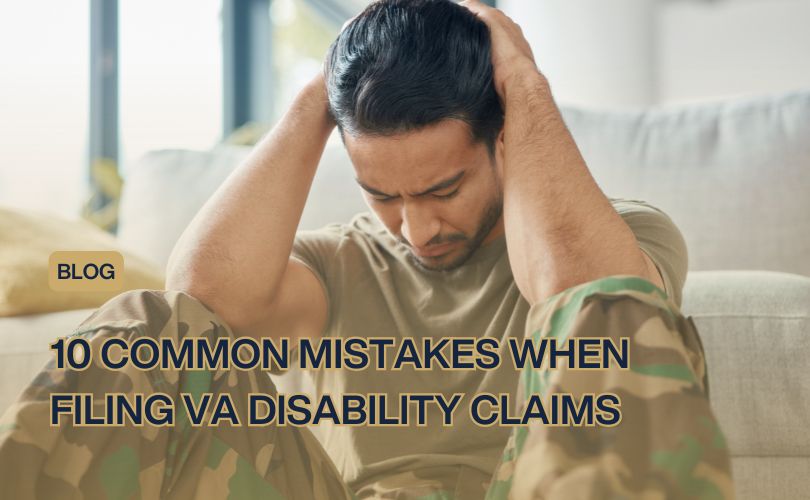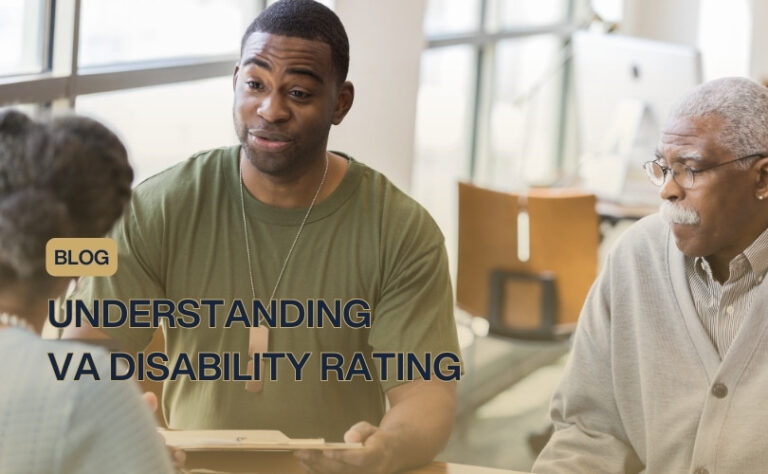
Mistakes often occur when filing for a VA disability, especially if you have never filed for a VA disability claim before, or you do not have someone available to at least accompany you. Many of these common mistakes when filing VA disability claims—although unintentional—can create delays and ultimately lead to denied disability claims.
For this article, we will explore some common mistakes when filing disability claims made by many veterans and how you can avoid them.
Common Mistakes to Avoid
At Veterans Choice, we’ve seen firsthand how common VA claims errors lead to VA claims denials. That’s why we made it our mission to provide veterans with the best educational help with VA disability claims and secure proper VA ratings and compensation.
1. Waiting for the Medical Condition to Get Serious
It is understandable to wait for clear evidence that confirms the symptoms of your condition. However, delaying your claim and waiting for it to get serious can complicate the process and can harm your health.
If you are certain that you have a condition that will qualify you for disability benefits, then you do not have to wait, as it can delay your benefits. Early filing ensures you establish a timeline supporting future claims if the condition worsens.
2. Delaying or Not Getting a Medical Opinion
If you are concerned that the VA might deny your claim and want to ensure that you exhibit clear symptoms of your condition, you can seek the help of a qualified medical professional to provide a clear opinion linking your condition to your military service.
Most veterans overlook the importance of obtaining a medical opinion; having this “nexus” can establish a clear medical opinion, especially for conditions that are not immediately evident during active duty.
3. Lack of Medical Information
The VA determines your rating based on medical evidence and other clinical documentation. Many veterans fail to provide sufficient medical information to support their claims.
Providing detailed records, such as service treatment records, private physician notes, and diagnostic test results, allows for a thorough evaluation that strengthens your case.
The more comprehensive your medical information, the less likely you are to receive VA claims denied.
4. Failing to Get Statements from Family and Friends
Obtaining written statements from people who know you well and can testify to the impact of your condition is called a “Buddy Statement”. Due to its simplicity—and the concern that the VA may not consider this substantial evidence—veterans choose to overlook it as valuable evidence.
Having family members, friends, or fellow service members offer statements on how your conditions affect your life can complement your medical evidence.
5. Exaggerating Your Symptoms
Outlining your symptoms is important as it helps the VA recognize your claim. However, some veterans often exaggerate or misrepresent their claims.
Not only does this lead to a denial, but it can damage your credibility. The VA employs experienced evaluators that can recognize inconsistencies in your claim. It is always advisable to be honest and maintain an accurate representation and description of your symptoms.
Focus solely on how your condition is impacting your daily life and how it can damage your ability to work.
6. Not Claiming for a Secondary Condition
Veterans often overlook claiming for a secondary condition, most often due to the lack of educational assistance or understanding of their conditions.
Our VA claims consultant understands that secondary conditions develop because of a primary service-connected disability. For example, chronic back pain can lead to depression, which is subject to another VA rating and compensation.
If you believe that you are developing a secondary condition to your primary condition, then always include it in your claim. Supply medical evidence supplementing its relation to your primary condition; you may also acquire another nexus letter or statement to substantiate this.
7. Hesitating to Submit Claims for Mental Health Conditions
Mental health conditions such as post-traumatic stress disorder (PTSD), severe anxiety, sleep disorders, and major depressive disorder are prevalent among veterans. However, most veterans often hesitate to submit claims for these conditions out of actual fear or uncertainty about the process.
It is important to note that mental health conditions are just as valid as physical injuries. Seeking help for these conditions and obtaining a diagnosis are valid and can help you attain more VA benefits.
8. Relying on the C&P Examiner
The Compensation and Pension (C&P) examination is an important part of the VA claims process. This makes most veterans believe that their findings are sufficient. It is critical to take responsibility for ensuring that you have a detailed and sustainable claim.
Include a well-written medical opinion—a nexus letter—and appropriate and complete medical documentation to finalize and strengthen your claim.
9. Giving Up After a Denial
A VA claim denial is discouraging, but it doesn’t mean it should end there. The majority of denials often result from errors or missing evidence, which can be appealed or processed through supplemental claims.
Check and review the denial letter and understand what led the VA to deny your claim. Once you’ve undergone proper evaluation of what may have led to the denial, take action and refile your claim.
10. Not Getting External Help
You can seek assistance from a VA claims consultant or veterans’ advocacy organization. Having the knowledge to pursue your claim will lessen your chance of mistakes, potentially avoid these common mistakes, and help you understand the VA claims process more effectively.
Get Veterans Choice for Educational Guidance
Employing the help of Veterans Choice can make filing your VA disability claim less overwhelming. We empower you with the tools, knowledge, and strategies needed to take control of your claim journey.
So, whether you need help gathering evidence, understanding your rating, or submitting an appeal, we can assist you.
Our VA claims consultants are here for you.
Visit Veterans Choice today to learn more about how we can help and secure the benefits you deserve.


